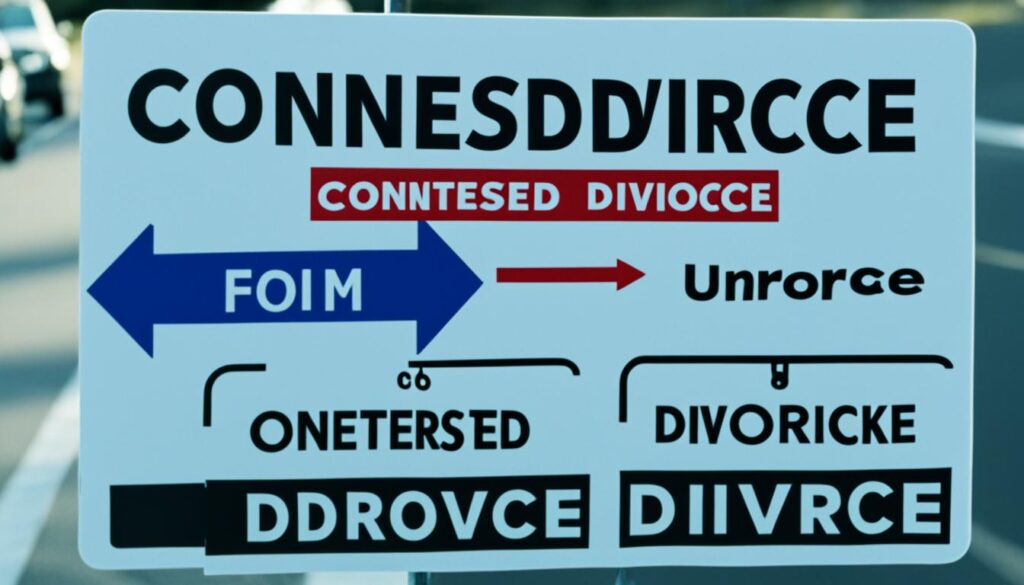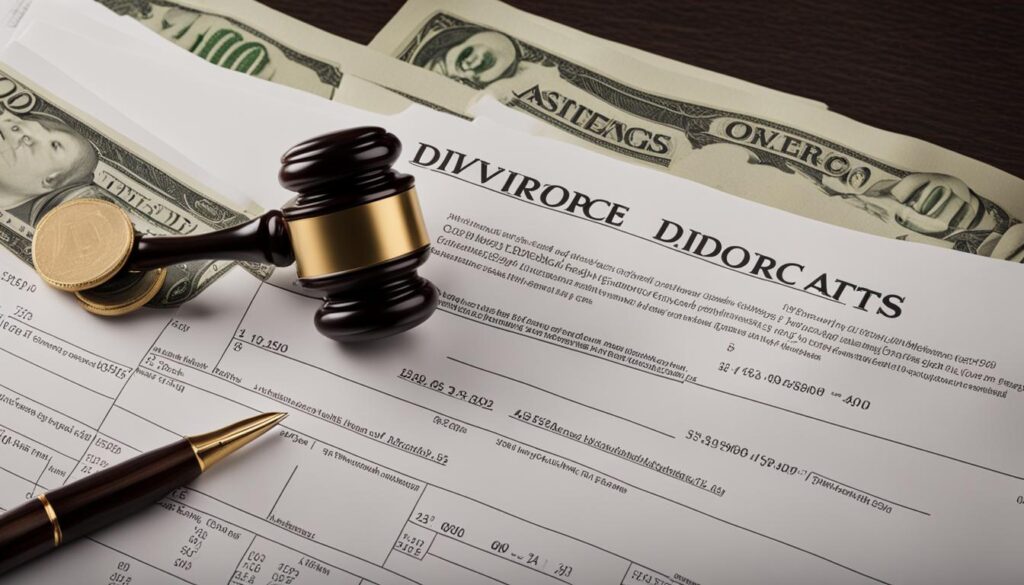Considering getting a divorce in Texas? Understanding the potential costs involved is extremely important. The expenses of a divorce can vary depending on various factors, including the complexity of your case and the level of agreement between you and your spouse. In this article, we discuss the average cost of divorce in Texas, the factors that can impact the cost, and some affordable options to consider.
Key Takeaways:
- The average cost of a divorce in Texas is around $15,600 to $23,500, depending on whether there are children involved.
- The complexity of the divorce, level of agreement between spouses, and choice of divorce process can impact the overall cost.
- Uncontested divorces tend to be less expensive, while contested divorces can be more costly.
- Additional expenses, such as divorce lawyer fees and filing fees, should be considered when calculating the total cost.
- Cost-saving options, such as representing oneself in court or opting for mediation, can help reduce expenses.
Factors that Impact the Cost
The cost of a divorce in Texas can be influenced by several factors. It’s important to understand these factors to get a clearer picture of what impacts divorce expenses in Texas.
Complexity of the Divorce
The complexity of a divorce case can significantly affect the overall cost. Issues such as child custody, property division, and alimony can increase the complexity and require more time and resources to resolve. Cases involving high-net-worth individuals or businesses owned by the couple may also incur higher costs due to the need for financial experts or forensic accountants.
Level of Agreement Between Spouses
Another factor that impacts the cost of divorce in Texas is the level of agreement between spouses. If both parties can come to a mutual agreement on key issues like child custody, support, and property division, the divorce process tends to be more streamlined and less expensive. On the other hand, if disagreements are prevalent, it may be necessary to go to court for resolution, resulting in higher legal fees and court costs.
Willingness to Work Together
The willingness of both spouses to work together and cooperate throughout the divorce process can significantly impact costs. If both parties are open to negotiated settlements or alternative dispute resolution methods like mediation or collaborative law, it can help save on attorney fees and court expenses. Litigation should be seen as a last resort, as it tends to be the most expensive option.
Service of Divorce Papers
Serving the spouse with divorce papers is an essential step in the divorce process, and it often incurs a fee. The cost of this service varies depending on the method used, such as hiring a professional process server or using certified mail. It’s important to consider these expenses when estimating the total cost of a divorce in Texas.
Attorney Fees
The cost of hiring an attorney is a significant factor in divorce expenses. Attorney fees can vary based on the lawyer’s experience, reputation, and geographic location. It’s essential to research and obtain quotes from multiple attorneys to find the best fit for your budget and legal needs. Some attorneys may charge a flat fee for certain services, while others charge an hourly rate.
Considering these factors can give individuals a better understanding of what impacts divorce costs in Texas. By being aware of the complexities involved, reaching agreements, and working together, couples can make informed decisions to help manage the expenses associated with divorce.

Average Cost of Divorce in Texas
When going through a divorce in Texas, it’s important to understand the potential expenses involved. The average cost of a divorce in Texas ranges from $15,600 to $23,500, depending on whether there are children involved. However, it’s important to note that these are average costs and can vary based on the unique circumstances of each case.
Several factors can influence the cost of a divorce in Texas. One significant factor is the complexity of the divorce. If there are multiple assets to divide or complex financial arrangements, the cost may be higher. The need for legal representation is another factor to consider. While it’s possible to handle a divorce without an attorney, having one can provide guidance and ensure that your interests are protected. The presence of contested issues, such as child custody or alimony, can also impact the final cost.
To illustrate the various expenses involved in a divorce, here is a breakdown:
| Expense | Cost Range |
|---|---|
| Legal Representation | $3,000 – $25,000+ |
| Court Filing Fees | $250 – $350 |
| Mediation | $3,000 – $7,000 |
| Child Custody Evaluation | $2,500 – $5,000 |
| Appraisals | $500 – $2,000 |
These are just some of the typical expenses involved in a divorce in Texas. Keep in mind that the costs can vary depending on the specifics of your situation.
It’s essential to consult with a qualified attorney who specializes in family law to get an accurate estimate of the potential costs involved in your divorce. They can provide guidance based on your specific circumstances and help you navigate the legal process.

Remember, each divorce case is unique, and the costs can vary significantly. By understanding the average cost range and the factors that influence expenses, you can better prepare for the financial aspects of your divorce in Texas.
Types of Divorce and Cost for Each Type
When it comes to getting a divorce in Texas, there are two main types to consider: uncontested and contested. The type of divorce you choose can have a significant impact on the overall cost of the process.
An uncontested divorce occurs when both spouses are in agreement regarding the terms of the divorce, including child custody, division of assets, and alimony. In this situation, the cost of an uncontested divorce in Texas is generally lower compared to a contested divorce.
In an uncontested divorce, the cost typically involves minimal expenses such as filing fees, paperwork, and, if necessary, the cost of hiring a mediator or lawyer to draft the necessary documents.

On the other hand, a contested divorce occurs when there are disagreements between spouses regarding various aspects of the divorce. These disagreements can prolong the process and increase the overall cost.
The cost of a contested divorce in Texas can vary widely depending on the complexity of the case and the issues being disputed. In general, a contested divorce can range from $5,000 to $20,000 or more. Factors that contribute to the higher cost include legal fees, court appearances, and the need for expert witnesses or forensic accountants.
In summary, an uncontested divorce tends to be less expensive in terms of both time and money, as both parties are in agreement and can work together to reach a resolution. On the other hand, a contested divorce can be more costly due to the need for legal representation and potential disputes that require court intervention.
Cost of Filing for Divorce in Texas
In Texas, the filing fees for divorce can vary depending on the county, but on average, they range from $250 to $350. These fees are paid to the court to file the initial divorce papers. It’s important to note that the filing fees are just one component of the overall cost of a divorce and do not include additional expenses such as attorney fees, mediation fees, or court costs.
When initiating a divorce in Texas, couples should budget for the filing fees as they are a necessary expense to begin the legal process. However, it’s crucial to remember that these fees are only a fraction of the total cost involved.
While the filing fees may seem like a small amount compared to the average cost of a divorce, it’s essential to account for other potential expenses that may arise during the proceedings. These additional costs may include attorney fees if legal representation is sought, fees for mediation services to facilitate negotiations, and court costs for any hearings or filings required.
“The filing fees for divorce in Texas are just the tip of the iceberg. Couples should anticipate and plan for other expenses such as attorney fees, mediation costs, and court fees.”
Couples need to be aware that the overall cost of filing for divorce in Texas can vary depending on the complexity of the case and the level of cooperation between the parties. Factors such as the division of assets, child custody arrangements, and spousal support can all impact the total cost of the divorce process.
While filing fees are the initial financial hurdle, it’s crucial for individuals navigating a divorce in Texas to consider the potential costs of hiring legal representation, engaging in mediation, and attending court proceedings.
Understanding the full scope of expenses involved in a divorce can help individuals plan and make informed decisions about their financial situation as they navigate the legal process.
Additional Expenses in a Texas Divorce
| Expense | Estimated Cost |
|---|---|
| Attorney fees | $3,000 – $15,000+ |
| Mediation costs | $3,000 – $8,000 |
| Court fees | Varies; typically $300 – $500 |
| Additional professional services (e.g., forensic accountant) | $2,500 – $10,000+ |
| Parenting classes | $40 – $100 |
| Child support evaluation | $500 – $2,000 |
In addition to the filing fees, divorcees should be prepared for other expenses, as shown in the table above. Attorney fees can range widely depending on the complexity of the case, with more contentious divorces often resulting in higher legal costs. Mediation costs and court fees should also be considered, as they are common in divorce proceedings. Furthermore, additional professional services, such as hiring a forensic accountant or undergoing a child support evaluation, may be necessary in certain cases, incurring even more costs.
By understanding the various expenses associated with filing for divorce in Texas, individuals can plan their finances accordingly and make informed decisions throughout the process.

Cost of Hiring a Divorce Lawyer in Texas
When going through a divorce, one of the crucial decisions you’ll need to make is whether to hire a divorce lawyer. Understanding the cost associated with hiring a divorce lawyer in Texas is essential for proper financial planning. The expenses involved can vary based on factors such as experience, expertise, and the attorney’s fee structure.
On average, family lawyers in Texas earn approximately $127,500 per year, slightly below the national average. However, it’s important to note that senior lawyers may charge higher fees, averaging around $158,700 per year. The level of experience and expertise an attorney brings to the table can significantly impact the cost of their services.
The cost of hiring a divorce lawyer in Texas can also be influenced by the fee structure they employ. Some attorneys charge a flat fee for their services, meaning you pay a predetermined amount for the entire divorce process. Others charge an hourly rate, where you are billed for the time spent working on your case.
It’s crucial to have open and transparent communication with your attorney regarding their fees and make sure you fully understand the pricing structure. This clarity will help you make informed decisions and avoid any unexpected financial surprises along the way.
Average Annual Income of Texas Family Lawyers
| Experience Level | Average Annual Income |
|---|---|
| Entry Level | $75,000 |
| Mid-Level | $127,500 |
| Senior Level | $158,700 |

It’s important to find a balance between the cost of hiring a divorce lawyer and their experience and expertise. While it may be tempting to opt for cheaper legal representation, it’s crucial to consider the long-term implications of your choice. An experienced attorney can help navigate the complexities of the legal process, provide valuable advice, and strive for the best possible outcome in your divorce case.
Cost-Effective Divorce Options
When it comes to getting a divorce in Texas, cost-saving options can provide relief during what can be an emotionally challenging process. By exploring affordable alternatives, individuals can navigate the divorce journey with financial peace of mind. Here are several cost-effective options to consider:
Representing Oneself in Court (Pro Se Divorce)
A pro se divorce, which involves representing oneself in court without legal representation, can be an affordable way to get a divorce in Texas. By taking this approach, individuals can eliminate attorney fees and retain more control over the process. However, it’s vital to thoroughly research and understand the legal requirements and procedures to ensure a successful outcome.
Seeking Short-Term Legal Help
In some cases, individuals may only require legal guidance or representation for specific issues during divorce proceedings. By seeking short-term legal help, such as consulting with an attorney on an hourly basis, individuals can save on overall costs while still benefiting from professional advice for critical aspects of their divorce.
Using Online Divorce Services for Document Preparation
Online divorce services offer a convenient and affordable way to handle document preparation. These services provide guidance and templates for completing the necessary paperwork, ensuring it meets the legal requirements of a Texas divorce. By utilizing online resources, individuals can save time and money by avoiding expensive attorney fees for document preparation.
Opting for Divorce Mediation
Divorce mediation is an increasingly popular and cost-saving alternative to litigation. During mediation, a neutral third-party mediator assists couples in reaching agreements on key aspects of their divorce, such as child custody, division of assets, and spousal support. Mediation can significantly reduce legal costs and promotes a more efficient and amicable resolution process.

By carefully evaluating these cost-effective divorce options, individuals can choose the approach that best suits their needs and budget. Whether representing oneself in court, seeking short-term legal help, using online services, or opting for mediation, these alternatives provide affordable ways to navigate the divorce process in Texas.
Other Factors That Impact the Cost of Divorce
In addition to the factors mentioned earlier, several other elements can significantly impact the cost of divorce in Texas. It’s crucial to consider these factors to gain a comprehensive understanding of the potential expenses involved in the process.
1. Serving the Spouse with Divorce Papers
When initiating a divorce, one party must serve the other with divorce papers. This process typically incurs a fee, which can contribute to the overall cost of the divorce.
2. Level of Agreement between Spouses
The level of agreement between spouses plays a crucial role in determining the cost of divorce. If both parties can reach amicable agreements on key issues like child custody, asset division, and spousal support, it can significantly reduce legal expenses.
3. Complexity of the Estate or Assets Involved
The complexity of the estate or assets involved in the divorce can have a substantial impact on the overall cost. High-value assets, business interests, extensive property holdings, or complex financial portfolios often require additional time, resources, and legal expertise, leading to increased expenses.
4. Choice of Divorce Process
The choice of divorce process also affects the overall cost. While an amicable uncontested divorce tends to be more cost-effective, a contentious and litigated divorce can be significantly more expensive due to legal representation, court fees, and lengthy proceedings.
To illustrate the potential impact of these factors, here’s a table summarizing how they can contribute to additional expenses in divorce:
| Factors | Impact on Divorce Expenses |
|---|---|
| Serving Divorce Papers | Incurs additional fee |
| Level of Agreement between Spouses | Higher agreement leads to cost reduction |
| Complexity of Estate or Assets | Increase in legal fees |
| Choice of Divorce Process | Contested divorces are more expensive |
By considering these factors and their potential impact on divorce expenses, individuals can make informed decisions throughout the divorce process, effectively managing their finances and ensuring a smoother transition to the next chapter of their lives.

Conclusion
In summary, the cost of getting a divorce in Texas can vary depending on a range of factors. While the average cost falls between $15,600 and $23,500, it’s crucial to recognize that each divorce is unique, and expenses can be influenced by various aspects, including the complexity of the divorce, the level of collaboration between spouses, and the choice of divorce process.
By gaining a thorough understanding of these factors and considering cost-effective options, individuals can make informed decisions to better manage the expenses associated with divorces in Texas. Exploring alternatives such as representing oneself in court, seeking short-term legal help, utilizing online divorce services, or opting for mediation can often help achieve a more affordable resolution.
Ultimately, when navigating the divorce process in Texas, it is important for individuals to be prepared for the potential financial implications. By carefully considering the factors at play and exploring cost-effective options, individuals can work towards minimizing expenses and moving forward with their lives.
FAQ
How much does it cost to get a divorce in Texas?
On average, a Texas divorce without children costs about $15,600, and one with children costs about $23,500. The actual cost can vary depending on the unique circumstances of each divorce.
What factors impact the cost of a divorce in Texas?
The cost of a divorce in Texas is influenced by factors such as complexity, collaboration, and willingness to work together. Other factors include the presence of children or multiple assets, the need for legal representation, and the presence of contested issues.
What is the average cost of a divorce in Texas?
The average cost of a divorce in Texas is between $15,600 and $23,500, depending on whether there are children involved. However, it’s important to note that these are average costs and the actual cost can vary.
What are the types of divorces in Texas and how much do they cost?
Texas offers two main types of divorces: uncontested and contested. An uncontested divorce, where both parties agree on the terms, tends to be less expensive and can range from little more than filing fees to additional costs for mediators or lawyers. A contested divorce, where disagreements exist, can be more costly, often ranging from $5,000 to $20,000 or more, depending on the complexity of the case.
How much are the filing fees for divorce in Texas?
The filing fees for divorce in Texas can vary depending on the county, but on average, they range from $250 to $350. These fees are paid to the court to file the initial divorce papers.
How much does it cost to hire a divorce lawyer in Texas?
The cost of hiring a divorce lawyer in Texas can vary based on factors such as experience and expertise. On average, a family lawyer in Texas makes about $127,500 per year. However, senior lawyers may charge higher fees, averaging around $158,700 per year. The cost can also be influenced by whether they charge a flat fee or an hourly rate.
What are the cost-effective options for getting a divorce in Texas?
Cost-effective options for getting a divorce in Texas include representing oneself in court, seeking short-term legal help for specific issues, using online divorce services for document preparation, or opting for divorce mediation.
What are the other factors that impact the cost of divorce in Texas?
Other factors that can impact the cost of divorce in Texas include serving the spouse with divorce papers, level of agreement between spouses, complexity of the estate or assets involved, and the choice of divorce process.
What is the summary of the cost of divorce in Texas?
The cost of getting a divorce in Texas can vary depending on various factors. By understanding these factors and considering cost-effective options, individuals can make informed decisions to help manage the expenses associated with divorce in Texas.
What are the key expenses involved in a Texas divorce?
The cost of Texas divorce can vary based on factors like legal fees, court filing expenses, mediation or arbitration costs, and if alimony or child support is involved. Additional expenses may include appraisals for property division, counseling for children, and fees for serving legal documents.










